ARTICLE AD BOX
3 hours ago
By Laura Gozzi, BBC News, Rome

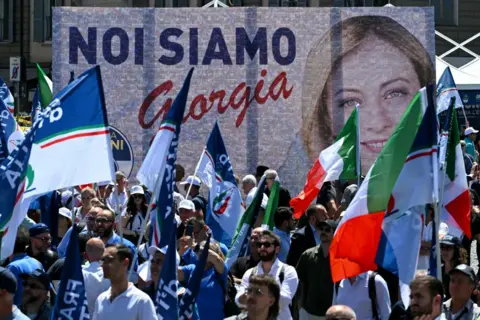 Getty Images
Getty Images
Giorgia Meloni has enjoyed steady ratings since becoming PM in 2022
Italians will begin voting on Saturday afternoon on the third of four days of European elections where people across 27 countries will choose members of the next EU Parliament.
Prime Minister Giorgia Meloni is hoping the result will tighten her grip on Italian politics. She has even urged voters to “just write Giorgia” on their ballot.
Most EU countries are voting on Sunday, after a turbulent few weeks in which two European leaders and several other politicians come under physical attack.
On Friday evening Denmark's Prime Minister Mette Frederiksen was assaulted in the street in Copenhagen, two days before Danes vote.
Leaders across Europe have united in shock at the latest attack, in the middle of elections involving a potential 373 million European voters.
Last month Slovak Prime Minister Robert Fico survived an attempt on his life and only recently was allowed out of hospital. Several German political figures have also been targeted.
These elections are not supposed to have a bearing on national politics, but the reality is very different, especially in Italy.
Ms Meloni, who leads the far-right Brothers of Italy (FdI), was appointed prime minister in 2022 and has taken the rare step of putting her name at the top of her party’s ballot, even though she has no intention of taking up a seat in the European Parliament.
Giorgia Meloni has enjoyed steady poll-ratings since becoming prime minister in 2022, buoyed by a fragmentated centrist and left-wing opposition and the gradual decline of her junior coalition partner, Matteo Salvini’s once-powerful populist League party, whose voters are being lured by the pull of FdI.
In a bid to reverse the trend, Mr Salvini has been pushing his party’s rhetoric further to the right.
The League’s electoral posters – denouncing all manner of EU-backed initiatives, from electric cars to tethered caps on plastic bottles – have attracted some ridicule, but also considerable attention.

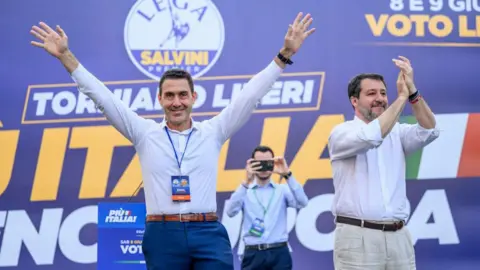 Antonio Masiello/Getty Images
Antonio Masiello/Getty Images
Matteo Salvini's rhetoric has been matched by his lead candidate, army general Roberto Vannacci
Mr Salvini’s lead candidate, Roberto Vannacci, has had the same effect. The army general was dismissed following self-publication of a book in which he expressed homophobic and racist views. Since becoming a League candidate, he has doubled down on them.
Hardly a day goes by when Roberto Vannacci’s messages are not amplified by the media. That could translate into votes for the League, but if it doesn't then trouble might be in store for Mr Salvini, whose leadership is beginning to be questioned.
The same scrutiny will be applied to the results of the left-wing Democratic Party (PD), whose leader Elly Schlein will hope to match the 19% of the vote it won in the 2019 elections if she is to stay in her post.
Further to the left, all eyes will be on Ilaria Salis – a self-described antifascist activist who has been detained in Hungary since 2023 on charges of participating in the beating of three far-right militants and being part of a criminal association. She is now running on the Left/Greens platform.
Italians will be able to cast their votes until late on Sunday evening when elsewhere in Europe the elections have already wrapped up.
The Netherlands voted on Thursday, and a Dutch exit poll suggested a tight race between a left-green alliance, narrowly ahead of anti-Islam populist Geert Wilders’ Freedom Party. An estimated turnout of 47% was the highest since 1989, rebutting any suggestion that voters had tired of politics.
Irish and Czech voters went to the polls on Friday.
Slovakia, Latvia and Malta also vote on Saturday, while Czechs vote for a second day.
Several Czech parties from different political groups in the European Parliament have formed a joint candidate list as a "cordon sanitaire" to counter populists from the ANO party of former Prime Minister Andrej Babis.
Germany is among the EU countries voting on Sunday, and latest polls indicate that the centre-right CDU/CSU may leapfrog Chancellor Olaf Scholz’s Social Democratic Party.
His party is fighting for second place with coalition partners the Greens and far-right opposition party Alternative for Germany (AfD). The AfD has been involved in a series of recent scandals over foreign interference, espionage and accusations of Nazism.
In France, which has the second largest number of MEPs in the parliament after Germany, President Emmanuel Macron’s Renaissance party is also vying for second place with a resurgent Socialist party under top candidate Raphaël Glucksmann.
Both parties are trailing Marine Le Pen’s National Rally (RN), which is consistently polling above 30%.
Calling for a high turnout in a TV interview on the penultimate day of the campaign, Mr Macron warned that "Europe has never been so threatened” by the surge of the right.
Other leaders have adopted a similarly urgent tone before the EU vote.
Slovak Prime Minister Robert Fico, who is recovering from surgery at home after last month's assassination attempt, returned to the political scene this week with a well-timed attack on Slovakia’s liberal opposition, the "anti-government media" and foreign-funded NGOs which he said had created a climate of hatred and intolerance that made the shooting possible.
Hungary’s Viktor Orban – who has been the most vocal opponent of EU support for Ukraine – warned that Europe was reaching a point of no return in terms of preventing conflict from spilling beyond the borders of Ukraine, and hit out at what he called the EU’s “war psychosis”.
Polls in Italy will be the last to close at 23:00 (21:00 GMT) on Sunday.
A projection, combining the first provisional results from some EU member states with estimates for the rest, will come out soon after.

 7 months ago
19
7 months ago
19
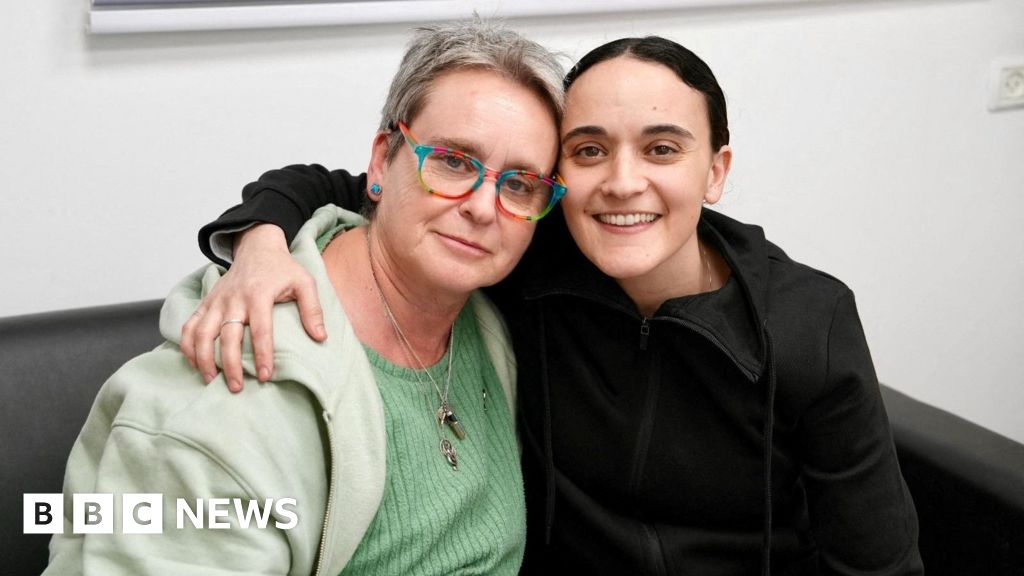
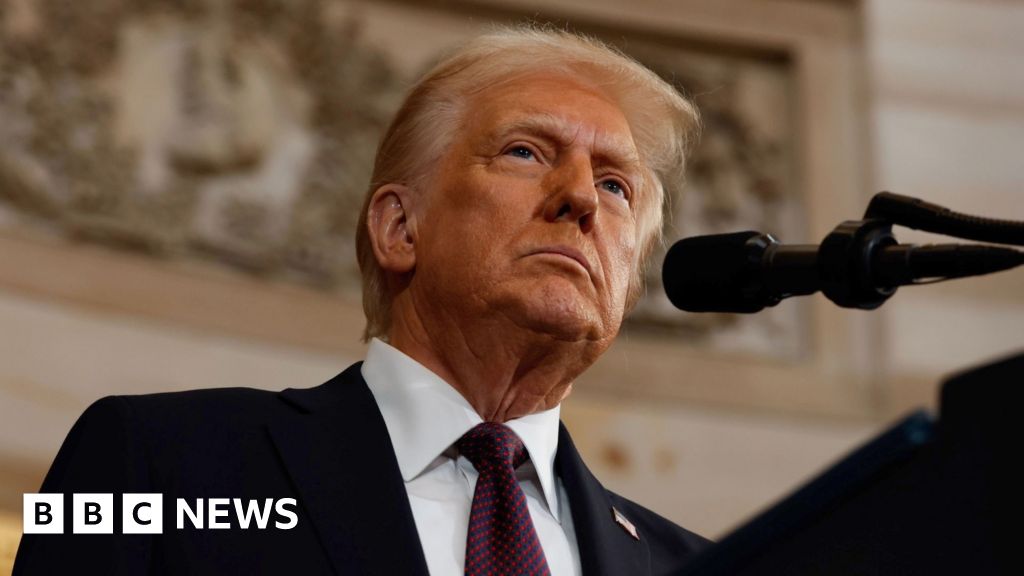
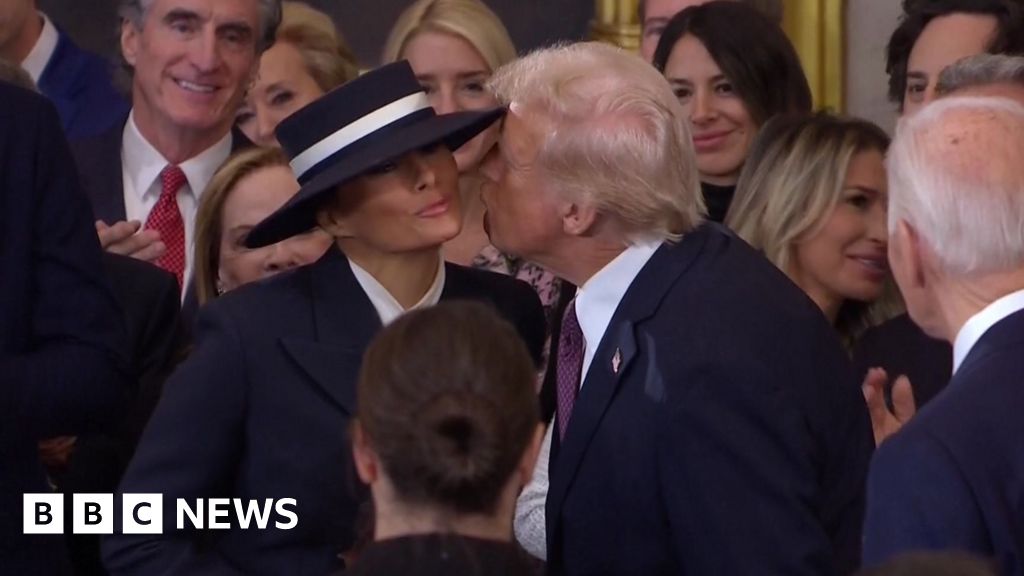





 English (US) ·
English (US) ·